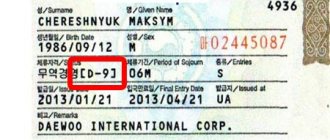No one is immune from problems with the law. You don't have to be a persistent offender to do this. Sometimes a simple coincidence of circumstances can radically change a person's life. As a result, he has a criminal record, which deprives him of many benefits and opportunities. Often, a citizen who has served his sentence feels like an outcast in society: they don’t want to hire him, they refuse to allow him to travel abroad. Therefore, many of those who have previously had problems with the law want to know whether it is possible to obtain a foreign passport with a criminal record in 2021 and whether the refusal to issue this document is legal.
How does having a criminal record affect obtaining a passport?
A foreign passport is a document identifying a citizen staying abroad. Those who plan to visit other countries for tourism purposes are issued two types of foreign passports:
- standard sample;
- biometric.
They can only be obtained subject to strict compliance with the rules established at the legislative level.
You can learn how a foreign passport and a criminal record are related to each other from Article 15 of the Federal Law of August 15, 1996 “On the procedure for leaving the Russian Federation and entering the Russian Federation” No. 114-FZ. In accordance with the provisions of this legislative act (paragraphs 3-5), the right to leave the country may be temporarily limited for citizens who:
- are suspects or, in accordance with the norms of criminal procedure legislation, are brought as defendants in the case before the court makes a decision or the sentence enters into legal force;
- convicted of committing illegal acts (before serving the sentence or before being released from it);
- evade fulfillment of obligations imposed by the court (until the moment of fulfillment or achievement of agreement between the parties to the dispute).
Analyzing the provisions of this law, we can conclude that the following persons are temporarily deprived of the right to travel abroad:
- those who have not served their sentence;
- under investigation;
- convicted persons (including those who received a suspended sentence).
There are no rules prohibiting persons with a criminal record from obtaining a foreign passport. Difficulties may arise when traveling outside the Russian Federation.
You can travel abroad only if your criminal record is expunged or expunged.
Which groups of people are prohibited from crossing the border?
In addition to the question of whether a Schengen visa is granted with a criminal record, a citizen must also find out whether he is included in the category of persons who are prohibited from crossing the border on the basis of Article 15 of Federal Law No. 114 “On the procedure for entry and exit from the territory of the Russian Federation.” In accordance with the provisions of this article, the ban on traveling abroad applies to the following categories of citizens:
- who have had access to state secrets over the past five years;
- undergoing military service in the ranks of the RF Armed Forces;
- having the status of an accused or suspected of committing a crime;
- convicted of committing a crime (including on probation);
- those who evade fulfilling the obligations imposed on them by the court;
- who provided false information about themselves (when receiving a foreign passport).
In addition to Russian legislation, additional factors may influence the refusal to issue a visa by a foreign embassy. For example, a citizen may be denied a Schengen visa without explanation if he has visited countries with a high level of terrorist threat several times in recent years. In addition, the visa decision may be negatively affected by interview results. Persons who have a criminal record should pay special attention to this.
How is a criminal record expunged (removed)?
Expungement of a criminal record occurs after the person has served his sentence (main and additional). If, during the period established by law, a citizen behaved exemplarily and did not commit new illegal actions, his criminal record is considered expunged.
In accordance with Article 86 of the Criminal Code of the Russian Federation, a criminal record is expunged within the following periods:
- for conditionally convicted persons - after the expiration of the probationary period;
- for citizens who have served a sentence more lenient than imprisonment - after a year;
- for persons who have served a sentence of imprisonment for crimes of minor and medium gravity - after 3 years;
- for those who have served a sentence of imprisonment for committing serious crimes - after 8 years;
- for those who have served their sentences for especially serious crimes - after 10 years.
As for the expungement of a criminal record, it occurs before expiration if the convicted person has proven his correction by exemplary behavior. It can also be removed as a result of a pardon or amnesty.
How to remove a criminal record
Withdrawal, unlike repayment, cannot happen on its own. To do this, a number of conditions must be met, namely:
- existence of grounds for expunging a criminal record;
- petition of the convicted person in court;
- positive court decision.
What grounds may be taken into account:
- the applicant dropped the charges against the convicted person;
- the proceedings have been terminated or closed;
- the statute of limitations has expired, and the convicted person has still not fulfilled his obligations for reasons beyond his control;
- The legislation has changed and the article under which the convicted person was sentenced is no longer in the Criminal Code.
As you can see, it is possible to remove a criminal record early, but this is a fairly rare occurrence.
What documents are needed to obtain a foreign passport?
The list of documents required to obtain an identity card for a Russian citizen abroad in 2021 is quite long. It includes the following papers:
- application form (with attachments if necessary);
- passport;
- previously issued passport (if any);
- receipt confirming payment of the state fee;
- photo of the established sample (when submitting an application through the State Services portal for a new-style passport, you must upload a digital photo; in case of personal application to the Department of Internal Affairs of the Ministry of Internal Affairs, you do not need to provide paper photographs - the photo will be taken by service employees; for those who apply for an old-style passport, you must attach 4 photos measuring 3.5 by 4.5 cm);
- documents confirming the change of personal data (if any);
- military ID or certificate in form F-32 (for men aged 18-27 years);
- permission from the command in case of performing military duty (does not apply to persons serving under conscription).
For those who receive a foreign passport after a criminal record, the package of documents must be supplemented with a certificate of release (issued by the police department) and a copy of the verdict (court order).
Which country would you rather live in? ⚡ Take the test in 2 minutes
You can learn more about what you will need to obtain a foreign identity card and how the procedure for obtaining it is carried out in the article “Applying for a foreign passport.”
Visa application
In fact, foreign consulates have little interest in the criminal record of visa applicants. For example, in the application form for a Schengen visa there is no column about criminal record at all. For diplomats, much more important is the issue of the candidate’s compliance with visa legislation, the presence of facts of violation of the law and the presence of fines in the territory of his country (or, for example, the entire European Union - in the case of receiving a Schengen), the availability of the necessary funds for travel, travel tickets and other issues. At the same time, the consulate may require additional information, including information about a criminal record.
Whether a criminal record affects obtaining a visa is up to the diplomats themselves to decide; the main thing is not to withhold such information and answer directly, because providing false information is much more likely to become a reason for refusing to issue a visa than the presence of criminal liability.
However, it is necessary to take into account the severity of the crime committed.
The article: “Obtaining a visa” will tell you more about how Russians can apply for a visa.
What to write in the application form if you have a criminal record
Filling out the column in the form regarding your criminal record is mandatory. It makes no sense to hide the fact that the applicant was previously convicted, since migration service employees carefully check the information received against various information databases (including the Ministry of Internal Affairs database).
The application will need to indicate where, when, under what article and for what period the applicant for a foreign passport was sentenced, as well as when he was released. The information must be documented.
What to do in case of a suspended conviction
In accordance with Article 86 of the Criminal Code of the Russian Federation, a criminal record should be understood as the legal status of a citizen convicted of committing a crime. A suspended sentence is the same as a criminal record: a person was convicted of committing a crime, the court simply took into account certain circumstances and decided to impose a more lenient punishment. Therefore, information about the presence of a suspended criminal record must be indicated in the application form for a foreign passport. Although this issue is actively discussed in various forums, and many lawyers say that the presence of an expunged suspended criminal record need not be mentioned at all.
But there is also a “other side of the coin”. The fact is that migration service employees will definitely check the submitted information and bring the applicant to administrative responsibility for providing deliberately false data. They do not have the right to refuse to issue a foreign passport if they have an expunged or expunged criminal record, so it is better to honestly report that this fact took place and present the above certificates.
Is it possible to leave the country with a criminal record in 2021?
Having a criminal past has a very negative impact on the social status of a former convict. Having a criminal record negatively affects not only relationships with people, but also the ability to travel abroad. Can I get a visa with a criminal record? To answer this question, it is necessary to take into account various factors: the severity of the crime committed, how long ago the person was released from custody, as well as the peculiarities of the legislation of the country at whose embassy the citizen is going to obtain a visa.
How does a criminal record get expunged?
Does a criminal record affect obtaining a Schengen visa? Of course, information about a person’s criminal past significantly reduces the chances of being granted permission to enter any EU country. But in answering the question whether a visa is given with a criminal record, it is necessary to take into account the fact that Russian legislation allows for the expungement of a criminal record, after which the citizen is not obliged to write in the application form about the presence of a criminal past. Thus, expungement or early expungement of a criminal record formally makes a citizen without a criminal record.
The procedure for expunging a criminal record occurs automatically. A former convict does not need to file a petition with the court or write a statement to the Ministry of Internal Affairs. Depending on the severity of the crime, expungement of a criminal record after release from custody is completed within:
- 10 years – for a particularly serious crime for which the prisoner was in prison for more than 10 years;
- 8 years – for a serious crime (prison term from 5 to 10 years);
- 3 years – for a crime of minor or medium gravity (imprisonment term up to 5 years);
- 1 year – for committing a crime, the punishment for which is not related to imprisonment.
Until 2009, persons sentenced to a suspended sentence had the opportunity to travel abroad. However, current legislation restricts them in this right. The presence of a suspended sentence prevents not only obtaining a visa, but also obtaining a passport.
Procedure for expunging a criminal record
Since obtaining a visa with a criminal record is impossible, a citizen can wait until it expires or initiate early withdrawal. To legally expunge a criminal record, the following reasons must exist.
- After his release from prison, the citizen had no problems with the law, complied with the requirements of the supervisory authority, and has a permanent job.
- The criminal charges were dropped at the applicant's initiative.
- The article under which a citizen ended up in prison was excluded from the Criminal Code of the Russian Federation.
- The criminal case was closed.
- The statute of limitations has expired.
Free legal support by phone:
Moscow, St. Petersburg, Russian Federation 8 (800) 350-83-26 (free call)
Unlike the expungement of a criminal record, which occurs automatically, the procedure for early expungement of a criminal record requires the mandatory filing of a court petition by the former convict. In addition, early expungement of a criminal record is possible only after half of the probationary period has passed. As a result of consideration of the submitted petition and the case materials, the court makes a decision to grant the petition or refuse to remove the criminal record.
Are there exceptions to the rules?
If expungement of a criminal record is impossible for objective reasons, and several years must pass before automatic expungement, then according to Russian law, a citizen does not have the right to issue a foreign passport. It follows from this that obtaining an entry visa to a foreign country also remains unavailable to him.
The loophole in the form of the fact that a person still has a valid international passport issued before imprisonment does not apply here, since a ban on leaving before the end of the expiration date of a criminal record is in the database of the Department of Internal Affairs of the Ministry of Internal Affairs. Even if a citizen receives a visa without deliberately indicating his criminal past to the embassy, he will be denied permission to cross border control.
Having a problem? Call a lawyer:
Moscow, St. Petersburg, Russian Federation 8 (800) 350-83-26 (free call)
Regarding travel to visa-free countries with an outstanding criminal record, this is also not possible. The ban here is explained by the fact that such a trip allows for the possibility of the citizen leaving for a third country.
How to apply for a visa
If a citizen has found the answer for himself as to whether it is possible to obtain Schengen status with a criminal record by early removal or expungement, then he has the opportunity to obtain a foreign passport and visa. In some cases, a visa document is not even required to travel abroad. You can find out which countries do not require visas on the website of the Russian Ministry of Foreign Affairs or by contacting the website of the embassy of a foreign state.
To obtain a Schengen visa, a citizen must fill out an application form, take photographs of the established form, collect the necessary documents, and pay a visa and service fee. Registration of an entry permit to the European Union takes from 5 to 8 working days. In the summer, this period in some embassies can last up to two or three weeks.
Preparation of documentation
Will they give you a visa if you have a criminal record? If it has already been repaid, and the submitted documents meet the requirements set by the embassy, then the reasons why a visa may be refused can only be associated with insufficient justification for the purpose of the trip. To avoid denial of a permit to enter the Schengen area, the applicant needs to pay special attention to the preparation of documentation.
The list of documents required for submission to the embassy includes:
- a form of a standard form (some embassies of EU countries allow you to fill out a form on their website or through the Internet resource of the Ministry of Foreign Affairs);
- a foreign passport with at least 3-4 months remaining until its expiration date;
- passport of a citizen of the Russian Federation;
- international insurance policy;
- two photographs 3.5 by 4.5 cm;
- documentary substantiation of the purpose of the trip;
- certificate from place of work;
- bank account statement or sponsorship letter (if it is not possible to provide a certificate from your place of employment);
- receipt of payment of the visa and service fee.
Procedure for obtaining a certificate
To obtain a certificate of good conduct for a visa, a former convict must contact the Ministry of Internal Affairs at the place of registration. Another option for obtaining a certificate is to contact the State Services website.
Based on the available information about the expungement of a criminal record due to the expiration of the probationary (supervisory) period or early expungement as a result of the satisfaction of a petition submitted to the court, a document on the absence of a criminal record will be issued by the Office of the Ministry of Internal Affairs of the Russian Federation at the place of registration of the citizen. The certificate is issued free of charge.
Which groups of people are prohibited from crossing the border?
In addition to the question of whether a Schengen visa is granted with a criminal record, a citizen must also find out whether he is included in the category of persons who are prohibited from crossing the border on the basis of Article 15 of Federal Law No. 114 “On the procedure for entry and exit from the territory of the Russian Federation.” In accordance with the provisions of this article, the ban on traveling abroad applies to the following categories of citizens:
- who have had access to state secrets over the past five years;
- undergoing military service in the ranks of the RF Armed Forces;
- having the status of an accused or suspected of committing a crime;
- convicted of committing a crime (including on probation);
- those who evade fulfilling the obligations imposed on them by the court;
- who provided false information about themselves (when receiving a foreign passport).
In addition to Russian legislation, additional factors may influence the refusal to issue a visa by a foreign embassy. For example, a citizen may be denied a Schengen visa without explanation if he has visited countries with a high level of terrorist threat several times in recent years. In addition, the visa decision may be negatively affected by interview results. Persons who have a criminal record should pay special attention to this.
Is it possible to immigrate to Canada with a criminal record: Video
Can being under investigation (detention) cause a refusal to issue a passport?
Being under investigation or being detained makes it impossible to obtain a foreign passport. Paragraph 3 of Article 15 of the Federal Law of August 15, 1996 “On the procedure for leaving the Russian Federation and entering the Russian Federation” No. 114-FZ provides that the right to leave (enter) the country may be temporarily limited for persons suspected of committing a crime or brought as defendants in a criminal case before the court makes a decision and the verdict comes into force.
However, there are some nuances that people who have problems with the law should definitely be aware of. They will be discussed below.
Traveling outside the country before expunging or expunging a criminal record: what you need to know
Citizens who have problems with the law are wondering whether it is possible to obtain a passport with an outstanding criminal record. Many will probably be surprised, but such a possibility exists. There are several exceptions to the rules that allow you to travel abroad before your criminal record is cleared or expunged.
In particular, you can obtain an identification document for a citizen of the Russian Federation abroad and leave the country if the need arises:
- urgently visit relatives and friends located outside the Russian Federation who have been diagnosed with a serious illness;
- attend the funeral of family members.
In both cases, it is necessary to document the occurrence of unforeseen circumstances. Evidence may include documents (certificates) from medical institutions where relatives are being treated, death certificates, or telegrams sent accordingly with messages about the death.
Citizens who have problems with the law have the right to submit an application for urgent travel outside the Russian Federation with a request to be released from serving their sentence for the period of the trip.
It is important to know
On the Internet you can find information about exceptions, in the presence of which it is still possible for a citizen with an outstanding criminal record to travel outside the country. Allegedly in the case when the health condition of a citizen requires it or due to the illness or death of a family member. This is actually a misconception, and here's why.
The fact is that an outstanding criminal record, despite the stereotype that has formed, is not an obstacle to traveling abroad. As we have already said, according to paragraph 4 of Art. 15 of the Federal Law “On leaving the Russian Federation and entering the Russian Federation”, such an obstacle will only be the fact of imposing a sentence, and it will be valid only until it is served or released from serving it.
A criminal record, and even more so the fact of its expungement, despite the direct connection, cannot be identified with the fact of serving a sentence. This follows, at a minimum, from the fact that the terms for expunging a criminal record, according to Part 3 of Art. 86 of the Criminal Code, begin to expire immediately after serving the sentence.
Thus, after actually serving the sentence (paying a fine, undergoing correctional labor or being released), a person can freely leave Russia even if he has an outstanding criminal record, regardless of the reasons, be it work, visiting relatives or a tourist trip.
The only exception is the establishment of administrative supervision in relation to a person who has been released from prison. In this case, according to paragraphs. 3-5 p. 1 tbsp. 4 Federal Law No. 64 dated 06.04. 2021, certain restrictive measures may be applied to the supervised person, which include a ban on leaving home at a set time and a ban on traveling outside a certain territory (city, region, country). If there are such restrictions, permission to leave the country must be given by law enforcement agencies.
In other cases, the freedom of movement of a citizen with an outstanding criminal record, but a sentence served or executed, is absolutely not limited. Another question is whether he will be able to get a visa with a criminal record, since it is issued by representatives of another state. Let's try to answer this question.
What do citizens with a criminal record say about the possibility of obtaining a passport?
Obtaining a foreign identity card if you have a criminal record is a fairly pressing problem. Every year thousands of people come under investigation, many of whom subsequently take the “path of correction” and want to lead a normal life. It is quite understandable that Russians are discussing this important issue in various forums. Here's what people who have encountered a similar problem write.
“I had a sad experience. For 10 years I was listed in the database of the Central Bureau of the Ministry of Internal Affairs as a person under investigation in a criminal case. According to the court decision, I received a 3-year suspended sentence with a 2-year probationary period (God had mercy from the zone). Anticipating possible problems, I took a certificate from the Federal Penitentiary Service stating that the decision had entered into legal force and the probationary period had ended. So in 10 years I changed two passports. There were no questions. When submitting documents, each time I presented a copy of the certificate, which the inspector sitting at the reception certified with a seal. A request was sent to the Central Antimonopoly Service, to which the answer was that the foreign passport could not be issued, but they gave it to me because there was a certificate. A year ago, I contacted the prosecutor’s office with a request to make changes to the Central Antimonopoly Service. After that, I received another international passport without presenting a certificate. For those who have parole or restrictions (supervision or something else), a foreign passport is issued only if there are compelling reasons (this could be the death of a close relative, the need to travel for treatment). If there are no restrictions, even an outstanding criminal record will not prevent you from obtaining a foreign passport.”











